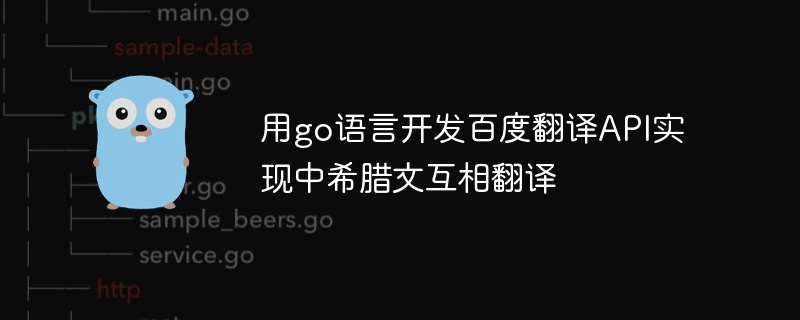Home >Backend Development >Golang >Using go language to develop Baidu translation API to realize mutual translation between Chinese and Greek
Using go language to develop Baidu translation API to realize mutual translation between Chinese and Greek
- WBOYWBOYWBOYWBOYWBOYWBOYWBOYWBOYWBOYWBOYWBOYWBOYWBOriginal
- 2023-08-13 10:19:45712browse

Using Go to develop Baidu Translation API to realize mutual translation between Chinese and Greek
At present, with the development of globalization, people’s need to communicate across national borders has become more and more The more important it is. For translation needs between different languages, Baidu Translation API provides a simple solution. This article will introduce how to use Go language to develop a program and use Baidu Translation API to achieve mutual translation between Chinese and Greek.
First, we need to create an application on the Baidu developer website. After logging in to the Baidu Developer website, click the "My Application" button, select the "Create New Application" button on the page, and fill in the relevant information of the application according to the instructions. After successful creation, we will get an API Key and Secret Key, which will be used in our Go program.
Next, we need to install the Baidu translation API library of Go language. Open the terminal and run the following command:
go get github.com/ying32/translate
This will download the Baidu Translation API library to your Go language development environment.
Now, we can start writing Go programs to translate Greek to each other. First, create a new Go file named "main.go". Then, import the required packages and libraries in the file:
package main
import (
"fmt"
"github.com/ying32/translate"
)Next, we need to set the API Key and Secret Key we obtained previously in the code:
func main() {
appid := "您的API Key"
secKey := "您的Secret Key"Next, we You can start to realize the function of translating Chinese to Greek. Use the following code to implement:
// 设置百度翻译API的配置
translate.SetDefault(translate.Config{
AppID: appid,
SecurityKey: secKey,
})
// 调用翻译方法
resp, err := translate.Do("中文", "zh", "el")
if err != nil {
fmt.Println(err)
return
}
fmt.Println("中文翻译为希腊文结果:", resp.TransResult[0].Dst)You need to replace "Chinese" in the code with the Chinese text you want to translate. "zh" means the source language is Chinese, and "el" means the target language is Greek. The translation result is saved in the resp.TransResult[0].Dst variable.
Now, we can realize the function of translating Greek to Chinese. Add the following code to your Go program:
// 调用翻译方法
resp, err = translate.Do("Ελληνική", "el", "zh")
if err != nil {
fmt.Println(err)
return
}
fmt.Println("希腊文翻译为中文结果:", resp.TransResult[0].Dst)Likewise, replace "Ελληνική" in the code with the Greek text you want to translate.
Finally, we need to add the following code to the main function in order to run our program:
}
At this point, our Go program has been completed. Now, you can run the following command in the terminal to compile and run the program:
go run main.go
In the terminal, you will see the results of Chinese to Greek translation and Greek to Chinese translation.
Through the guide of this article, we learned how to use the Go language to develop a program and use the Baidu Translation API to achieve mutual translation between Chinese and Greek. This is a very useful tool for people who need to communicate across languages. Hope this article helps you!
The above is the detailed content of Using go language to develop Baidu translation API to realize mutual translation between Chinese and Greek. For more information, please follow other related articles on the PHP Chinese website!

